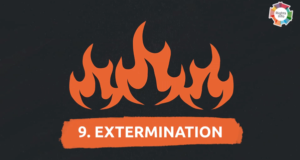In order to highlight the impact of the siege and closure of the Gaza Strip on the civilian population, the Palestinian Center for Human Rights (PCHR) is publishing a series of “Narratives Under Siege” on their website. These short articles are based on personal testimonies and experiences of life in the Gaza Strip, highlighting the restrictions, and violations, being imposed on the civilians of Gaza. To view all the narrativeson the website, click here
Narratives Under Siege: Al Gherbawi Taxi office, Gaza city
Early Monday morning in Gaza city: the streets are sunny and quiet. As men and women walk to work, a smattering of cars drive through the city, but the vast majority of Gazans are on foot. Pedestrians stroll past vehicles that are double, even treble parked against the broken side-walks, and the distinctive yellow Gaza taxis are few and very far between.
Abu Khalil (left) and Sa'ed Mohammed Al Gherbawi at the Al Gherbawi taxi office in Gaza city. Al Gherbawi taxis have been operating for fourty years, but the office is now running just three cars
Sa'ed Mohammed Al Gherbawi runs Al Gherbawi taxis, and is already behind his desk at the city centre taxi office. "My family has been running taxis in Gaza for forty years, and I've been working here since 1983" he says. "We have a good business, with fifteen cars and twenty drivers. But we cannot operate without fuel. When the benzin deliveries were cut in February, we started to rely on diesel; but in the middle of April the diesel supplies were cut too, and now we can only afford enough diesel to keep one of our cars running full time. We manage to run another two cars on domestic cooking gas. But that is all we have now – three cars operating out of fifteen."
Fuel shortages are nothing new in Gaza. Israel has been deliberately restricting fuel deliveries to the entire Gaza Strip since October 2007. But these latest restrictions are unprecedented. During April this year, Israel stopped all fuel deliveries to Gaza for a total of 25 days, and permitted only miniscule deliveries during the remaining five days of the month. In total, 152,000 litres of benzin entered Gaza in April, less than 5% of the overall daily need, and 33,280 litres of diesel, which is 9.5% of the overall daily need. Fuel prices have subsequently rocketed. Diesel has gone from 100 Shekels ($25) per twenty litres to 350 Shekels (almost $100) in the last eight weeks, whilst benzin, which the majority of cars run on, is now totally unavailable. Black market fuel prices are even steeper. Across the Gaza Strip gas stations have closed, and up to ninety percent of cars are now off the roads, overwhelming the skeletal public transport services, and forcing schools and universities to suspend teaching because students and teachers can't get to their lessons. Throughout the Gaza Strip the streets are piled with rotting, stinking garbage, because all Gaza municipalities have now suspended collection services due to lack of fuel.
Collective punishment of a civilian population is illegal under international human rights and humanitarian law, but Gazans are being forced to walk to their work, homes, schools, hospitals, and everywhere else they need or want to go. Sick and injured patients, including those who need life-saving treatment, risk being stranded without ambulances, which have now been forced to restrict their services. Patients have sometimes been forced to ride donkeys or mules in order to reach hospitals for emergency treatment.
Two weeks ago the United Nations Relief and Works Agency (UNRWA), which distributes food and medical aid across the Gaza Strip, was forced to temporarily suspend food distribution due to lack of fuel. UNWRA says it has been "Pushed to the brink" by the deliberate fuel cuts, and now has just enough fuel to continue operating for the next twenty days.
After almost two years of living under Israeli siege, Gazans are creative with the resources they do have. Drivers who need benzin have converted their cars to run on domestic cooking gas, and diesel drivers have even resorted to converting their vehicles to run on cooking oil. But these conversions are often primitive, and dangerous as the vehicles weren't originally manufactured for gas or cooking oil. Cooking gas is highly volatile, whilst the fumes from cooking oil are rank, can cause severe nausea and, according to some doctors, are also potentially carcinogenic.
At the Gherbawi taxi office, Sa'ed is on the phone, apologising to another customer for the lack of taxis. One of the drivers, fifty year old Abu Khalil, has worked with Gherbawi taxis for almost twenty five years. "When business is good I make about 1,100 Shekels ($275) a month" says Abu Khalil. "But I haven't worked at all for the last five days. I've been at home, sleeping, because there is nothing else to do. Now I walk to the taxi office hoping for work, and then I walk home again."
Sa'ed Al Gherbawi says he now has to turn down 90% of requests for taxis. "We have to ask people where they want to go before we can agree to take them. And now we are actually receiving more requests than ever, because a lot of car owners have no gas and they need taxis too!" But he remains defiantly hopeful that his business will survive until fuel does eventually arrive in Gaza. "My family has run this firm for forty years, and the important thing is that we have a lot of long-term customers who want us to stay open, and good drivers." he says. "For now we will manage on diesel and cooking gas, even though I have to use the cooking gas from my own home."
 International Solidarity Movement Nonviolence. Justice. Freedom.
International Solidarity Movement Nonviolence. Justice. Freedom.




